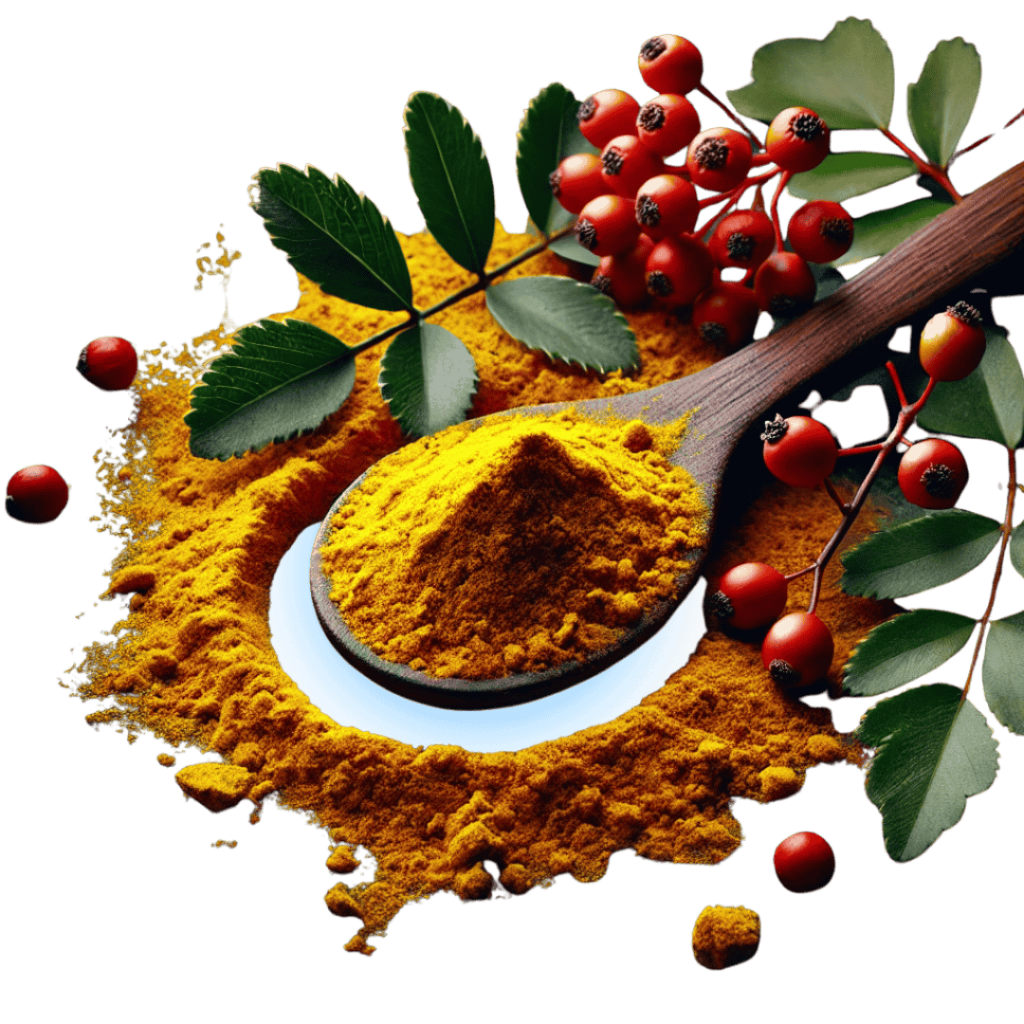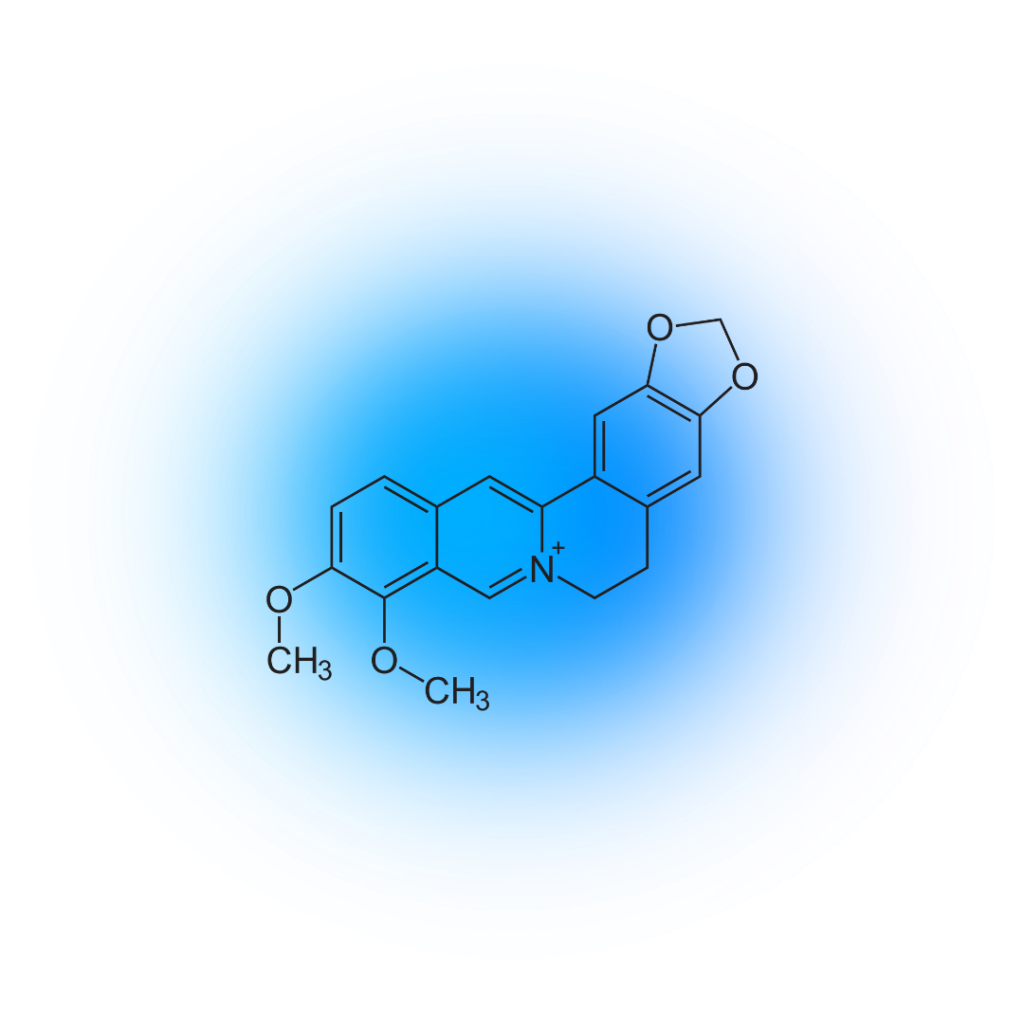The benefits of Berberine
Table of contents
WHAT IS BERBERINE?
Berberine is a natural alkaloid found in various plant organs - bark, leaves, stems, roots and rhizomes - found in plants such as berberis, Oregon grape, Chinese columbine and tree turmeric. Used for thousands of years in Ayurvedic and traditional Chinese medicine, it was first recognised for its antimicrobial, antiprotozoal and anti-diarrhoeal properties. Think of it as the 'multi-purpose agent' of the plant world, capable of playing several roles according to need, while remaining a fascinating example of an ancestral remedy integrated with modern science.
WHAT IMPACT DOES THIS HAVE ON WEIGHT LOSS?
By improving insulin sensitivity and regulating carbohydrate and lipid metabolism, berberine can help you lose between 2 and 5 kg over several months, depending on your lifestyle.
DHB, which is more effective at lower doses, offers comparable results and is easier to use.

BERBERINE: ANTI-DIABETIC EFFECTS AND GLYCAEMIA REGULATION
Clinical studies in patients with type 2 diabetes show that berberine can reduce blood sugar levels in a similar way to certain conventional antihyperglycaemic treatments. For example, in a randomised trial, a daily dose of around 1 gram of berberine reduced fasting blood glucose levels and HbA1c (the famous marker of long-term glycaemic control) in a comparable way to agents such as metformin or rosiglitazone. What is particularly interesting is that berberine, as well as lowering blood sugar, also acts on the regulation of insulin and blood lipids, demonstrating a multifactorial effect on metabolism. In addition, activation of AMPK, the central regulator of energy homeostasis, plays a major role in these effects - an action often found in new-generation anti-diabetic treatments.
BERBERINE AND ITS IMPACT ON WEIGHT
Weight management is an essential component of metabolic health, and here again berberine stands out. Clinical trials have shown that, particularly in patients undergoing treatment with antipsychotic drugs - which induce weight gain and metabolic disturbances - berberine supplementation (600 to 900 mg per day) helps to reduce body fat, improve the lipid profile and reduce insulin resistance. In concrete terms, studies have reported a loss of several kilos and notable improvements in cholesterol markers, illustrating berberine's potential as an adjuvant in the prevention of metabolic syndrome and associated cardiovascular complications.

THE EFFECT OF BERBERINE ON CARDIOVASCULAR HEALTH
In addition to its effects on blood sugar levels, berberine plays an interesting role in modulating the lipid profile. The mechanisms involved differ from those of conventional statins: while the latter act by blocking the production of HMG-CoA reductase in the liver, berberine appears to regulate key proteins involved in cholesterol metabolism and lipoprotein distribution. Animal and clinical studies have shown a significant reduction in LDL ('bad') cholesterol and an increase in HDL, as well as a reduction in triglycerides. In a trial involving patients intolerant to statins, the combination of a nutraceutical product containing berberine, policosanols and fermented red rice reduced LDL by almost 32 %, a significant improvement compared with the 25 % obtained with certain drugs.
BERBERINE ON INFLAMMATION AND LIVER FUNCTION
Berberine also has anti-inflammatory and antioxidant properties, acting in particular on pathways such as NF-kappa B. These actions help to reduce inflammatory markers such as C-reactive protein (CRP), which is implicated in the development of cardiovascular and metabolic complications. In cell culture and animal models, berberine has demonstrated its ability to inhibit the proliferation of liver cells responsible for fibrosis, suggesting potential benefits in the prevention of diseases such as non-alcoholic fatty liver (NAFLD). In addition, preliminary studies indicate that in patients with a history of colorectal cancer, berberine may reduce the rate of polyp recurrence, offering a promising avenue for cancer prevention.

EFFECT OF BEBERIN ON THE NERVOUS SYSTEM
On the neurological side, berberine interacts with several neurotransmitters and signalling pathways involved in regulating mood and protecting neurons. Studies on animal models of diseases such as Parkinson's and Huntington's have shown that berberine can, at variable doses, protect dopaminergic neurons, improve short-term memory and stimulate autophagy mechanisms, thereby facilitating the elimination of abnormal proteins. Although certain results even indicate a reduction in oxidative stress and modulation of the inflammatory response in the brain, it is important to note that these effects are still mainly documented in animals and require robust clinical confirmation in humans.
EFFECTS ON REPRODUCTIVE HEALTH VIA BERBERINE
Polycystic ovary syndrome (PCOS) is an area where berberine stands out. In affected women, it has been shown to improve insulin sensitivity, reduce visceral fat mass and improve hormone regulation. Clinical studies comparing berberine with standard treatments have shown significant improvements in menstrual cycles, reduced androgen levels and improved ovulation, with positive repercussions on fertility. This effect on reproductive health demonstrates the versatility of berberine and its potential as a therapeutic tool in various metabolic dysfunctions.

ANTI-AGEING EFFECTS AND CELLULAR PROTECTION OF BERBERINE
In addition to its metabolic benefits, berberine has been studied for its anti-ageing properties. In vitro and in vivo research (in insects and rodents) has shown that berberine can delay cellular senescence, extend lifespan and improve overall health. For example, in models of ageing, berberine has been shown to extend lifespan by 17 % in naturally aged mice and by up to 50 % in mice exposed to chemotherapeutic agents. These anti-ageing effects are partly attributed to activation of AMPK, modulation of oxidative states and better regulation of cell proliferation, which helps to preserve tissue integrity and cell function.
METFORMIN OR BERBERINE?
Interestingly, some of berberine's effects are similar to those of metformin, a standard antihyperglycaemic drug used in type 2 diabetes. Despite notable differences in chemical structure and bioavailability, the two agents share the ability to activate AMPK and modulate processes linked to oxidation and inflammation. However, unlike metformin - which can sometimes interfere with exercise-induced muscle adaptations - studies on berberine and exercise remain mixed, with some even suggesting a synergy with physical activity. This comparison underlines the value of berberine as an alternative or complement in the management of metabolic and cardiovascular diseases, but also highlights the need for high-quality comparative studies.

MECHANISMS OF ACTION OF BERBERINE
Berberine's strength lies in its action on the major regulators of energy homeostasis and cellular stress. It activates AMPK, considered to be the 'orchestra conductor' of energy responses, and also modulates other pathways such as PKC and sirtuin 1 (SIRT1). This activation triggers a cascade of signals that improve glucose uptake, stimulate lipid breakdown, reduce oxidative stress and reduce inflammation. Berberine also activates the p38 pathway and the Nrf2 factor, thereby increasing the production of cytoprotective and antioxidant proteins. These complex, interconnected mechanisms explain how berberine can influence a variety of biological processes - from metabolic functions to cellular protection against environmental stress and ageing.
WHAT IS THE BEST FORM OF BERBERINE?
Berberine exists in several forms and natural sources, each with varying bioavailability and efficacy. Here is a comparison of the main forms available on the market:
1. Berberine hydrochloride (Berberine HCl)
This is the most common form used in food supplements. Extracted mainly from Berberis aristata, it is well documented for its effects on blood sugar levels and metabolism. However, its intestinal absorption is low (around 5 %), as it is rapidly metabolised and eliminated by the liver. To improve its effectiveness, high doses are often required (900 to 1500 mg/day).
2. Dihydroberberine (DHB)
Dihydroberberine is a reduced form of berberine, resulting from a natural conversion process in the intestine. This version improves bioavailability because it is more easily absorbed by intestinal cells before being converted back into active berberine in the body. It is said to be absorbed around 5 times better than conventional berberine, which means that the doses required can be reduced and any gastrointestinal side-effects mitigated. This form is therefore particularly interesting for people who have difficulty tolerating high doses of berberine HCl.

WHEN AND HOW SHOULD BERBERINE OR DIHYDROBERBERINE BE TAKEN?
Berberine should be taken 15 to 30 minutes before meals to optimise its effect on blood sugar levels and insulin sensitivity. The recommended dose varies between 900 and 1500 mg per day, divided into 2 to 3 doses. For better absorption, it can be combined with lipids or bioenhancers such as piperine.
Dihydroberberine (DHB), which is more bioavailable, is absorbed up to 5 times better, enabling doses to be reduced to 250-500 mg once or twice a day. Better tolerated from a digestive point of view, it is an interesting alternative for those with intestinal sensitivities.
WHAT ARE THE SIDE EFFECTS OF BERBERINE?
Berberine can cause digestive problems (bloating, diarrhoea, constipation, cramps), especially at first. It also interacts with certain drugs such as antidiabetics and anticoagulants. Prolonged intake could influence intestinal flora, although this effect has yet to be scientifically investigated.
DHB, which is better absorbed, reduces these inconveniences while sharing the same precautions for use, particularly in the case of medical treatment.
REGULATION OF BERBERINE
Dihydroberberine is not currently authorised in Europe, as it is considered a Novel Food.
Berberine, on the other hand, is authorised in Europe with a maximum dosage of 350 mg. You can find berberine at this dosage in our Fat Burner.

CONCLUSION AND OUTLOOK
In a nutshell, berberine is a multi-faceted plant compound whose benefits go far beyond simply reducing blood sugar levels. Its effects on lipid profile, liver function, inflammation, cardiovascular health, neurological protection and even the ageing process make it a promising candidate for the treatment of various metabolic and inflammatory conditions. Although numerous studies - often carried out on animals or in clinical trials of varying quality - support its potential, it is essential to pursue rigorous large-scale research in order to confirm these effects and better understand its mechanisms of action.
In the meantime, berberine can be seen as an interesting adjunct in the management of diseases such as type 2 diabetes, metabolic syndrome or PCOS, provided it is used under medical supervision and taking into account its possible interactions with other treatments. As always, "even the best medicine must be used with caution" - a maxim that remains valid in a context where science and tradition are coming together to offer new therapeutic avenues.
Dong, Hui; Wang, Nan; Zhao, Li; Lu, Fuer (2012) - Berberine in the Treatment of Type 2 Diabetes Mellitus: A Systemic Review and Meta-Analysis
➝ Evidence-Based Complementary and Alternative Medicine, 2012
Chueh, Wei-Han; Lin, Jin-Yuarn (2011) - Berberine, an Isoquinoline Alkaloid in Herbal Plants, Protects Pancreatic Islets and Serum Lipids in Nonobese Diabetic Mice
➝ Journal of Agricultural and Food Chemistry, 59(14)
Lan, Tian; Shen, Xiaoyan; Liu, Peiqing et al (2010) - Berberine Ameliorates Renal Injury in Diabetic C57BL/6 Mice: Involvement of Suppression of SphK-S1P Signaling Pathway
➝ Archives of Biochemistry and Biophysics, 502(2)
Zhou, Zheng-Xian; Song, Dan-Qing et al (2010) - Berberine Lowers Blood Glucose in Type 2 Diabetes Mellitus Patients Through Increasing Insulin Receptor Expression
➝ Metabolism, 59(2)
Yan, Ziyou; Zheng, Wenjie et al (2015) - Meta-analysis of the Effect and Safety of Berberine in the Treatment of Type 2 Diabetes Mellitus, Hyperlipidemia, and Hypertension
➝ Journal of Ethnopharmacology, 161
Qiu, Yuying; Zhang, Jing et al (2021) - The Effect of Berberine Adjunctive Treatment on Glycolipid Metabolism in Patients With Schizophrenia: A Randomized, Double-Blind, Placebo-Controlled Clinical Trial
➝ Psychiatry Research, 300
Kong, Wei-Jia; Wei, Jin et al (2008) - Combination of Simvastatin with Berberine Improves the Lipid-Lowering Efficacy
➝ Metabolism, 57(8)
Imenshahidi, Mohsen; Hosseinzadeh, Hossein (2016) - Berberis vulgaris and Berberine: An Update Review
➝ Phytotherapy Research, 30(11)
D'Angelo, Angela; Bianchi, Lucio et al (2013) - Effects of Berberine on Lipid Profile in Subjects With Low Cardiovascular Risk
➝ Expert Opinion on Biological Therapy, 13(4)
Guo, Zhentao; Sun, Hongri et al (2015) - Anti-hypertensive and Renoprotective Effects of Berberine in Spontaneously Hypertensive Rats
➝ Clinical and Experimental Hypertension, 37(4)
Wang, Jie; Guo, Tao et al (2015) - Berberine Via Suppression of Transient Receptor Potential Vanilloid 4 Channel Improves Vascular Stiffness in Mice
➝ Journal of Cellular and Molecular Medicine, 19(11)
Sun, Xu; Zhang, Xiaodong et al (2009) - Berberine Inhibits Hepatic Stellate Cell Proliferation and Prevents Experimental Liver Fibrosis
➝ Biological and Pharmaceutical Bulletin, 32(9)
Navrotskaya, Valeriya; Oxenkrug, Gregory et al (2012) - Berberine Prolongs Life Span and Stimulates Locomotor Activity of Drosophila Melanogaster
➝ American Journal of Plant Sciences, 3(7)
Luo, Zhijun; Wang, Haoran et al (2017) - Metformin and Berberine, Two Versatile Drugs in Treatment of Common Metabolic Diseases
➝ Oncotarget, 9(11)
Reid, Justin J.; Castor, William M. et al (2018) - Metformin Inhibits Mitochondrial Adaptations to Aerobic Exercise Training in Older Adults
➝ Aging Cell, 18(1)
Chen, Wei; Miao, Yu-Qiang et al (2011) - Bioavailability Study of Berberine and the Enhancing Effects of TPGS on Intestinal Absorption in Rats
➝ AAPS PharmSciTech, 12(2)
Xie, Hong-Guang; Lai, Li et al (2010) - Extensive Intestinal First-Pass Elimination and Predominant Hepatic Distribution of Berberine Explain Its Low Plasma Levels in Rats
➝ Drug Metabolism and Disposition, 38(10)
Chen, Yangchao; Feng, Ru et al (2015) - Transforming Berberine Into Its Intestine-Absorbable Form by the Gut Microbiota
➝ Scientific Reports, 5
Pang, Bing; Zhao, Lin-Hua et al (2015) - Application of Berberine on Treating Type 2 Diabetes Mellitus
➝ International Journal of Endocrinology, 2015
Yin, Jun; Xing, Huili; Ye, Jianping (2008) - Efficacy of Berberine in Patients with Type 2 Diabetes Mellitus
➝ Metabolism, 57(5)


